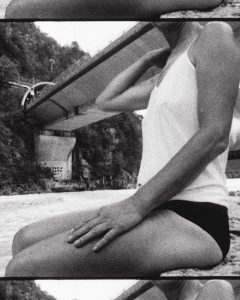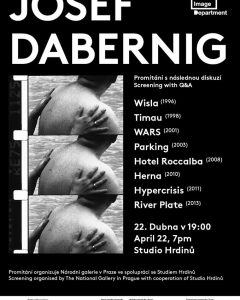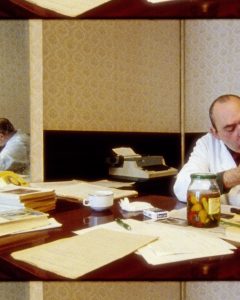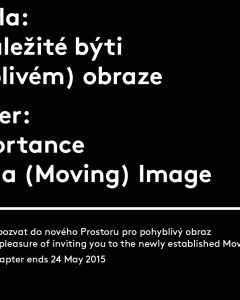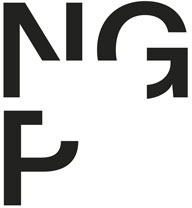Josef Dabernig /Screening with Q&A./ Promítání s následnou diskuzí
Národní galerie v Praze a Studio Hrdinů si Vás dovoluje pozvat na promítání filmů Josefa Daberniga u příležitosti výstavy “Jak je důležité býti v (pohyblivém) obraze”.
The National Gallery in Prague and Studio Hrdinu has the pleasure of inviting you to the screening of Josef Dabernig’s films for the occasion of the exhibition „The Importance of Being a (Moving) Image.
/ vstup volný! /
Wisla
1996, 16mm on SD Video, b/w, 8 min
Director, Script and Production: Josef Dabernig
Camera: Thomas Baumann
Editing and Sound: Josef Dabernig, Martin Kaltner
Cast: Josef Dabernig, Martin Kaltner – Emil Brix, Jerzy Fedorowicz, Ludwik Mietta-Mikolajewicz, Rembert Schleicher
Funding: if innovative film Austria, Office of the Provincial Government of Lower Austria, Department for Culture and Leisure
Two performers, in the roles of coach and assistant coach of a football team, follow the progress of a fictitious “crucial” match. They are in an empty stadium, the only figures captured by the camera, which records the significant gestures of the protagonists.
Timau
1998, 16mm on SD Video, b/w, 20 min
Directors, Script, Editing and Sound: Josef Dabernig, Markus Scherer
Camera: Christian Giesser
Cast: Josef Dabernig, Wolfgang Dabernig, Markus Scherer – Marino Grassi, Cesira Leschiutta
Production: Josef Dabernig
Funding: if innovative film Austria.
Three uniformed men in a car driving up a mountain road. Finally they unload their heavy packs and, between bushes and boulders, begin to carry it uphill. The increasingly questionable logic of this process is accentuated by the apparent physical handicap of one of the men.
WARS
2001, 16mm on SD Video, b/w, 10 min
Director, Script, Editing, Sound and Production: Josef Dabernig
Camera: Christian Giesser
Cast: Josef Dabernig, Ingeburg Wurzer, Otto Zitko
Funding: if innovative film Austria, Department of Culture of the City of Vienna
Business is at a standstill in the dining car of a long-distance train: waitress, waiter and cook sit back and wait, conveying the indifferent phlegm of fatigue and below capacity employment.
Parking
2003, MiniDV on SD Video, b/w, 6 min
Director, Script and Production: Josef Dabernig
Camera: Norbert Lechner, Inge Manka
Editing and Sound: Markus Scherer
Cast: Josef Dabernig, Herbert Stattler
Funding: if innovative film Austria
A car stops at the roadside. While still sitting, the driver and passenger, two middle-aged men, remove their clothing deliberately.
Hotel Roccalba
2008, 35mm on SD Video, b/w, 10 min
Director, Script, Editing and Production: Josef Dabernig
Camera: Christian Giesser
Sound design: Michael Palm
Cast: Annemarie Dabernig, Anni Dabernig, Josef Dabernig sen., Josef Dabernig, Wolfgang Dabernig, Karin Franz, Maria Franz, Isabella Hollauf, Hedwig Saxenhuber, Georg Schöllhammer, Ingeburg Wurzer, Otto Zitko
Funding: if innovative film Austria, ORF – Film and Television Agreement
Sunday afternoon in Hotel Roccalba: Is this an old-age-home, a recreational facility or simply a hotel? The life of a 12-member group in the dilapidated facility leaves the question open.
Herna
2010, 35mm on SD Video, b/w, 17 min
Director, Script, Editing and Production: Josef Dabernig
Radio Drama: Bruno Pellandini
Voices: Frederike von Stechow, Johanna Orsini-Rosenberg, Paul Matic, Branko Samarovski
Camera: Christian Giesser
Sound design: Michael Palm
Cast: Prokop Holoubek, Barbora Šedivá, Ruben Helia, Filip Cenek, Josef Dabernig
Funding: if innovative film Austria, ORF – Film and Television Agreement
Herna is a filmic miniature about the passion of gambling, edited together with a soundtrack consisting of a radio play by Bruno Pellandini which provides a rich counterpoint. A dramatic, acoustic kaleidoscope of four voices unfolds as the gambler loses himself in space and time and his wife and child are stuck in a car. The theme under discussion is about life and death, possession and loss.
Hypercrisis
2011, 35mm on HD Video, colour, sound, 17 min
Director, Script, Editing and Production: Josef Dabernig
Camera: Christian Giesser
Sound design: Elisabeth Hildebrandt, Michael Palm
Music: Can (first version), Iulian Patranoiu (second version), Giuseppe Verdi
Cast: Harutyun Alpetyan, Arusiak Arevshatyan, Eduard Arevshatyan, Ruben Arevshatyan, Shushan Arevshatyan, Josef Dabernig, Wolfgang Dabernig, Angela Dolidze, Alfons Egger, Goschka Gawlik, Isabella Hollauf, Zaruhi Hovhannisyan, Christian Kravagna, Gagik Nshanyan, Karen Poghosyan, Daniel Shvelidze, Konstantin Shvelidze, Murtaz Shvelidze, Ingeburg Wurzer, Otto Zitko
Funding: if innovative film Austria, Department of Culture of the City of Vienna, Galerie Andreas Huber
The former recreation home for Soviet cinematographers in the South Caucasus has been repurposed to accommodate writers. But that does not seem to work very well either. At present, only Boris Martow from Moscow, a talent from the promising times of the perestroika, is on the guest list. Amidst the faded glory of the institution for privileged artists, the poet tries to overcome his continuing creative crisis.
River Plate
2013, 35mm on HD Video, b/w, 16 min
Director, Script, Editing and Production: Josef Dabernig
Camera: Christian Giesser
Sound design: Michael Palm
Cast: María Berríos, Josef Dabernig, Wolfgang Dabernig, Isabella Hollauf, Ingeburg Wurzer, Otto Zitko
Funding: if innovative film Austria, ORF – Film and Television Agreement
River Plate displays a micro society in a fragmented body-narration. Knees, shoulders, feet and bellies are signifiers of articulated human presence, revealing nothing else against a claustrophobic background of cement, stone and water.
